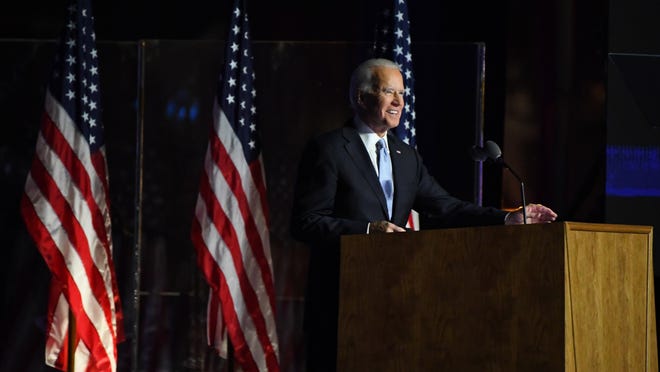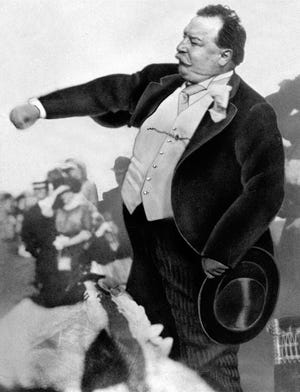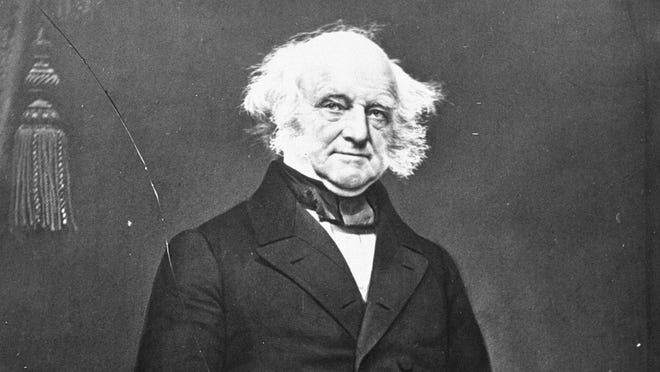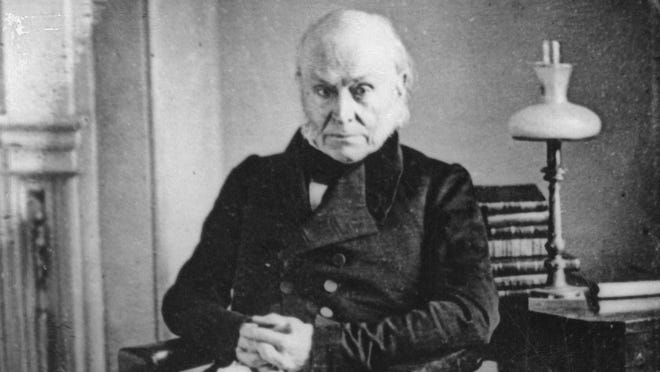President One Term Then Elected Again
President Donald Trump will join the list of Commanders-in-chief who were denied a second term after running for reelection.
Quondam vice president Joe Biden was projected to defeat President Trump, thus making Trump the tenth incumbent to become a one-term U.S. president.
From John Adams to George H.W. Bush, x Commanders-in-Chief throughout U.S. history take run for re-ballot and lost.
Let'south take a look into the past — at U.S. presidents who didn't get a 2d four years because they were denied by voters in the general election.
Voting 2022 alive updates:Long lines plague New York; Election Day forecast shows proficient weather across The states; Zeta storm
George H.W. Bush-league

The almost recent one-term president was George H.West. Bush-league. The Republican incumbent served every bit the 41st president of the United States from 1989 to 1993, but lost re-election to Democrat William (Neb) Clinton, who went on to consummate two terms.

Bush-league's White House biography attributes his defeat to the state's "discontent at home from a unpleasing economy, rising violence in inner cities, and continued high deficit spending."
Jimmy Carter
The 39th president of the Us, Democrat James (Jimmy) Carter, served from 1977 to 1981. He lost his re-election campaign to Republican Ronald Reagan, who went on to two full terms.
Carter'due south biography points to several factors that contributed to his loss — including a brusk recession and the earnest-taking of U.S. embassy staff in Iran. On the day Carter left office, Iran released 52 Americans.
Gerald Ford
Serving from 1974 to 1977, Gerald Ford was the 38thpresident of the United States. The Republican incumbent lost re-election to President Carter.
Following the resignation of President Richard Nixon after the Watergate scandal, Ford became the starting time unelected president in U.S. history. Ford'due south controversial pardon of Nixon had consequences — and many blame it (forth with numerous issues including a poor economy and the autumn of Southward Vietnam) to have cost him the presidency.
Herbert Hoover

Republican Herbert Hoover was the 31stpresident of the United States, serving from 1929 to 1933. He lost re-election to Democrat Franklin D. Roosevelt, who went on to consummate three total terms.
Within months of Hoover'due south election, the stock market crashed — spiraling the land into the Great Depression.
"His opponents in Congress, who he felt were sabotaging his programme for their ain political gain, unfairly painted him as a callous and fell President," reads his White Firm biography. "Hoover became the scapegoat for the Depression and was desperately defeated in 1932."
William Howard Taft

The 27th president of the United States, Republican William Howard Taft, served from 1909 to 1913. He lost his re-election campaign to Democrat Woodrow Wilson, who went on to complete two full terms.
According to Taft's biography, the president "alienated many liberal Republicans who later formed the Progressive Party." The party's divide ended his presidency. When Republicans renominated Taft in 1912, Roosevelt left to lead to Progressives, guaranteeing the election of Wilson.
Benjamin Harrison

Serving from 1889 to 1893, Benjamin Harrison was the 23rd president of the U.s.. The Republican incumbent lost re-election to Democrat Grover Cleveland. Many point to growing discontent of third-party Populists, unpopularity of high tariffs and government spending at contributors to his defeat.
Harrison had initially replaced Cleveland in the Democrat's 1888 campaign for re-election. Simply Cleveland ran again in 1892 and won — making him a two-term (though not consecutive) president.
Martin Van Buren

The 8th president of the United states of america, Democrat Martin Van Buren, served from 1837 to 1841. He lost his re-ballot entrada to William Henry Harrison of the Whig political party, who died not long after taking role.
His biography points to the panic of 1837, where hundreds of banks and businesses failed — halting prosperity the country had witnessed in recent years. Van Buren "devoted himself to maintaining the solvency of the national Government," just his remedies prolonged the low, and he lost reelection.
John Quincy Adams

Serving from 1825 to 1829, John Quincy Adams of the Whig party was the sixth president of the United States. The incumbent lost re-ballot to Andrew Jackson of the Democratic-Republicans.
According to his White House biography, Adams' loss is attributed to Jacksonian opponents' accusations of corruption and public plunder — "an ordeal Adams did not hands carry."
John Adams

The offset one-term president was John Adams. The Federalist incumbent served as the 2nd president of the United states from 1797 to 1801, merely lost re-ballot to Democratic-Republican Thomas Jefferson.
"In the campaign of 1800 the Republicans were united and effective, the Federalists badly divided," Adams' biography reads, noting that Adams polled simply a few electoral votes less than Jefferson.

Source: https://www.usatoday.com/story/news/politics/elections/2020/10/30/one-term-presidents-u-s-presidents-who-ran-reelection-but-lost/6085465002/
Post a Comment for "President One Term Then Elected Again"